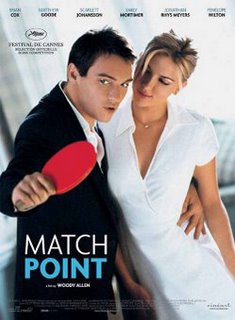Sunday, January 08, 2006
Match Point
 At the beginning of "Match Point," Woody Allen's 40th directorial feature and first set in London, Chris Wilton (Jonathon Rhys-Meyers) declares, "The man who said I'd rather be lucky than good saw deeply into life." While Chris' story and that of "Match Point" are deeply rooted in the play of luck and incidence, the triumph of Woody Allen's "Match Point" has little to do with either.
At the beginning of "Match Point," Woody Allen's 40th directorial feature and first set in London, Chris Wilton (Jonathon Rhys-Meyers) declares, "The man who said I'd rather be lucky than good saw deeply into life." While Chris' story and that of "Match Point" are deeply rooted in the play of luck and incidence, the triumph of Woody Allen's "Match Point" has little to do with either.A failed tennis pro, Wilton lands a job as a country club instructor. He quickly finds a passage into the upper crust of English society when he befriends Tom Hewett (Matthew Goode), a tennis pupil. Wilton's affinity for the Hewett family balloons when, in a reveal that screams to be revered, he meets Tom's voluptuous girlfriend Nola (Scarlett Johansson). Although he entertains the affections of Tom's sister Chloe to the point of marriage and employment with her father (Brian Cox), Wilton's lust for Nola draws him into a never-ending juggle of comfort and passion.
Although Johansson's sexpot sheen demonstrates why Allen has claimed he discovered a new muse in the young actress, Myers' performance is less convincing. His line readings sound hurried and stiff. The young actor's guilt-ridden expressions, however, convey Wilton's growing agitation deftly.
The heritage of Wilton's character is quickly made explicit by Allen. Early in the film, Wilton is shown reading Dostoyevsky's "Crime and Punishment" on the sofa bed in his cramped loft. The parallels between Wilton and Raskolnikov (the novel's psychologically tormented central character) aren't completely laid bare until later in the film, when Wilton ends his balancing act with some buckshot and spends the remainder of the film learning to live with his massive guilt.
As luck invades the criminal investigation into Wilton's actions, Allen not only masterfully manipulates audience expectations concerning Wilton's fate but also invites one to ask: is luck something we should wish for? In the case of the accomplished Allen, the answer is a firm 'no.'
(photo courtesy of www.wikipedia.com)
Post a Comment
Wilcox vox. | Blogger Templates by Gecko &
Fly
No part of the content or the blog may be reproduced without permission.